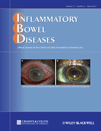Oncogenic Smad3 signaling induced by chronic inflammation is an early event in ulcerative colitis-associated carcinogenesis
Abstract
Background:
Both chronic inflammation and somatic mutations likely contribute to the pathogenesis of ulcerative colitis (UC)-associated dysplasia and cancer. On the other hand, both tumor suppression and oncogenesis can result from transforming growth factor (TGF)-β signaling. TGF-β type I receptor (TβRI) and Ras-associated kinases differentially phosphorylate a mediator, Smad3, to become C-terminally phosphorylated Smad3 (pSmad3C), linker phosphorylated Smad3 (pSmad3L), and both C-terminally and linker phosphorylated Smad3 (pSmad3L/C). The pSmad3C/p21WAF1 pathway transmits a cytostatic TGF-β signal, while pSmad3L and pSmad3L/C promote cell proliferation by upregulating c-Myc oncoprotein. The purpose of this study was to clarify the alteration of Smad3 signaling during UC-associated carcinogenesis.
Methods:
By immunostaining and immunofluorescence, we compared pSmad3C-, pSmad3L-, and pSmad3L/C-mediated signaling in colorectal specimens representing colitis, dysplasia, or cancer from eight UC patients with signaling in normal colonic crypts. We also investigated p53 expression and mutations of p53 and K-ras genes. We further sought functional meaning of the phosphorylated Smad3-mediated signaling in vitro.
Results:
As enterocytes in normal crypts migrated upward toward the lumen, cytostatic pSmad3C/p21WAF1 tended to increase, while pSmad3L/c-Myc shown by progenitor cells gradually decreased. Colitis specimens showed prominence of pSmad3L/C/c-Myc, mediated by TGF-β and tumor necrosis factor (TNF)-α, in all enterocyte nuclei throughout entire crypts. In proportion with increases in frequency of p53 and K-ras mutations during progression from dysplasia to cancer, the oncogenic pSmad3L/c-Myc pathway came to be dominant with suppression of the pSmad3C/p21WAF1 pathway.
Conclusions:
Oncogenic Smad3 signaling, altered by chronic inflammation and eventually somatic mutations, promotes UC-associated neoplastic progression by upregulating growth-related protein. (Inflamm Bowel Dis 2011)




